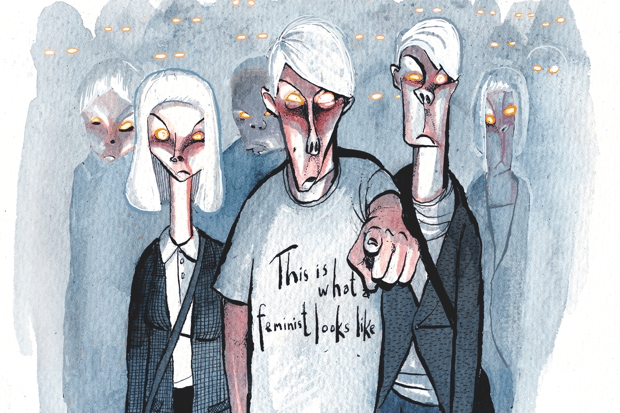The much-overused word “woke” — basically meaning to be at all moments of the day and night conscious of racial and sexual discrimination — has been remarkably resistant to criticism, reason and even ridicule. Ever since the initial exposure and denunciation of Harvey Weinstein in 2017 — a long-drawn-out prosecution and sentencing only recently concluded — the “wokes” have paraded their righteousness in every corner of society with very little pushback. Occasionally, a super baddie such as Bill Cosby gets released from prison on constitutional grounds, but super-wokes in the United States never let such minor reversals slow them down, since the public momentum and the arguments are overwhelmingly in their favor.
Even the harshest critics of woke, such as the right-wing governor of Florida, Ron DeSantis, don’t usually criticize violations of due process — that prosaically worded but essential element of the Fifth Amendment. DeSantis (a merciless military lawyer when he served in Iraq and at Guantánamo Bay) is no more a friend of civil liberties or due process than he is of homosexuals and terrorists.
Woke’s worst excesses go unchallenged in part because it claims the moral high ground, and almost no one dares to question the high ground’s location in US political geography. Who can disagree with its noble aims when woke so loudly and insistently demands that men stop abusing women, that whites stop abusing blacks and that straights stop abusing gays? Indeed, even the rare liberal opponents of woke usually give in to the media’s requirement that they genuflect to social justice before they say anything critical — they must testify in advance to the nobility and sincerity of woke before they feel entitled to dispute any of its more outlandish requirements.
I confess that I’ve found myself doing the same weaselly thing at times: yes, I will piously acknowledge, former senator Al Franken’s behavior toward women was “boorish” and “insensitive,” even though the behavior of female senators such as Kirsten Gillibrand toward Franken was vicious, unfair and incomparably worse than anything Franken ever did to a woman before Gillibrand helped drive him from office. Yes, I will say publicly, I myself once had to fire a male employee for sexual harassment of women in my office. I unhesitatingly described this incident during a Canadian radio interview with an ultra-woke host, though I have never publicly discussed (until now) the case of a female employee I dismissed for doxxing a female critic of #MeToo who had been published in the pages of Harper’s magazine, of which I am the publisher.
But recently I’ve come to realize that the moral ground of woke is neither very high nor particularly moral, as in the case of Gillibrand’s persecution of Franken. Woke’s belief in universal principles of justice is highly colored (please pardon the pun), often extremely self-interested and sometimes morally reprehensible. I understood this clearly for the first time when I read a column by Simon Kuper in the Financial Times this past December. In it he discussed the political controversy swirling around having the World Cup in Qatar and the burning ethical question of whether it was morally wrong to attend the tournament as a journalist or a fan, given the government’s dismal record on human and labor rights. Kuper, who covered the games in Qatar, described a WhatsApp debate he had with the writer Benjamin Moser about Kuper’s allegedly immoral presence at the event. For Moser, an American champion of gay rights, it seems that even watching the games on TV was unacceptable.
Moser: “How horrible that people go to this thing, pretend like it’s about sports, etc., but who cares about a hated and persecuted minority, it’s all good fun anyway.” I don’t quite follow Moser’s logic — it is absurd to assume that anyone who watched the World Cup was “pretending” that it was about sports. Even the most radical proponent of human rights would acknowledge that the World Cup is first and foremost about a sport, although money is probably a close second. But I quibble.
Kuper: “I don’t believe that whataboutism is a proper argument, but what would you say to the response, ‘Well, you grew up in Texas where gay sex was illegal until 2003?’ I’ve been repeatedly told that homosexuality here in Qatar is de facto tolerated as long as it’s private, just like hetero hookups on Tinder…”
Moser: “Your point re Texas is well taken. But if it was any other group this wouldn’t be a question. It sends a clear message that gay people are dispensable.”
How does Moser know that’s the case? In any event, as Kuper pointed out, the late journalist Grant Wahl, who covered the World Cup, protested Qatar’s anti-gay laws by appearing at a soccer match wearing a rainbow T-shirt and was only briefly detained.
However, it’s the following statement that crumbles the moral high ground under Moser’s feet. When Kuper admits to the “joy” of watching one’s team compete in the World Cup, Moser replies: “I am just not sure what there is to enjoy in those circumstances. If you went to a shop and tried on a shirt and the saleswoman was like, ‘This was made by a seven-year-old in Bangladesh who is kept in a cage,’ would you say, ‘Yeah, but this color looks good on me?’”
The example Moser gives is idiotic, but it’s his creation of a moral equivalency between the harassment of gays and imprisoned child labor that’s morally offensive, that gives away the shallowness of the woke commitment to universal human rights and social justice. Putting children in cages and forcing them to work in factories is vastly worse in absolute moral terms than the formal ostracizing of gay people, so I have to wonder if Ben Moser and others like him have an authentic moral argument to make. I’m beginning to think they don’t.
This article was originally published in The Spectator’s May 2023 World edition.

























